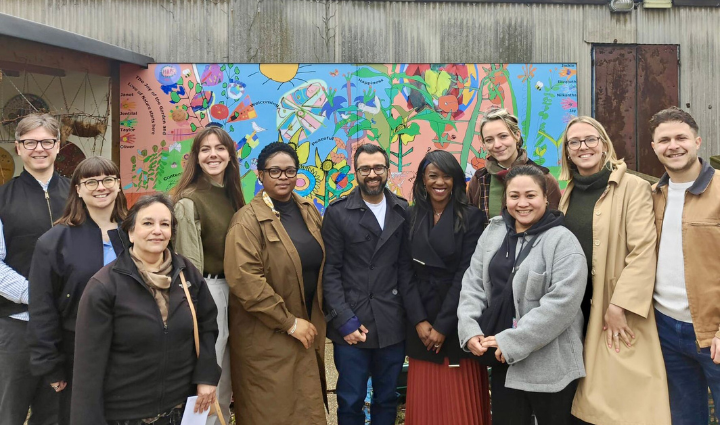
A visit from London’s Deputy Mayor for Communities highlights the power of collaboration
Tucked away on the second floor of a small office block in Dollis Hill, Northwest London, the Work Rights Centre office rarely takes centre stage. So when we were invited to host a visit from London’s Deputy Mayor for Communities and Social Justice, Dr Debbie Weekes-Bernard and her team at the Greater London Authority (GLA), we jumped at the chance to show her what goes on behind the scenes.
The GLA has played a key part in supporting the Work Rights Centre in our journey from one desk in Wembley Library to, nine years later, an organisation that undertakes policy development and strategic litigation at the highest level. The GLA has funded training, delivered by our legal advisers, to build employment advice capacity among 15 organisations supporting London’s underserved communities. Two years later, thanks to renewed support from the GLA we look forward to welcoming another cohort of trainees with an interest in offering high-quality advice at the intersection of migration issues and labour exploitation.
Given our long-standing relationship with the GLA, we thought it high-time that Debbie met some of our service users to better understand the impact receiving employment advice has had on their lives. We also wanted to give our clients the opportunity to voice their concerns to Debbie and Krupesh Hirani, Assembly Member for Brent and Harrow who joined her on the day.
Good employment advice can be life-changing
Debbie and Krupesh met our client Agnes, who is hoping to be near the end of her Employment Tribunal battle with the employer who sacked her on finding out that Agnes was pregnant. Our Senior Legal Adviser Bethany Birdsall has supported Agnes through the employment tribunal process, with the judge deciding that, as a worker, Agnes should have been given safe suitable alternative work or a maternity suspension with full pay until four weeks before her due date. Agnes also won her pregnancy discrimination claim due to the failure of her boss to conduct a risk assessment and firing her. While the payment she expects to receive won’t undo the financial strain she experienced in the run-up to her baby’s birth, it will provide some stability to help her get back on her feet.
Agnes’ case has taken years to fight, and we are still waiting for the remedy hearing to take place. Similarly, our client Aditi* described to Debbie and Krupesh her battle for justice with the care agency that exploited her through non-provision of work. Despite moving her entire life and family to the UK from India, Aditi found the role she had been promised did not materialise. When she complained about this to her manager, she was threatened with deportation. This battle is likely to take years due to long waits at the Employment Tribunal, and will require ongoing support from both our employment advice and immigration teams.
When facing a crisis situation at work, it can be incredibly difficult to speak out against mistreatment, especially as a migrant worker. Aditi heard about the Work Rights Centre through a friend, while Agnes was referred by another charity. The message for the GLA was clear: wider awareness of the advice services that exist to help migrant workers is instrumental in equipping foreign-born Londoners with the tools to fight exploitation at work.
The value in building capacity at both at third -and local authority level
Having experienced exploitation working in the social care sector, Agnes described the need for local councils to do more due diligence when handing out social care contracts. This would make sure that those which exploit their workers are not legitimised by such contracts. Debbie agreed that due diligence is important, and that while the GLA does this already, it needs to be done on a council level too. While some councils have signed up to an Ethical Recruitment Initiative, Krupesh added that this is not consistent across the city.
We also agreed that there would be great value in raising awareness of migrant workers’ particular vulnerabilities, entitlements, and routes to remedy among council staff. This is particularly valuable for local authority staff who support with victims of modern slavery in a first responder role, but also for staff working to support migrant care workers on employer-sponsored visas to leave exploitative jobs and find a bona fide employer as part of the Rematching Project funded by the Department for Health and Social Care.
It was promising for all to hear Debbie’s and the GLA’s commitment to helping foreign-born Londoners feel just as valued as every other member of the city. Our client Sasheena, who also works in social care, described asserting her rights at work, only to be spoken to in a degrading and insulting way. Disappointingly, our clients often describe how their employers expect them to acquiesce to unfair treatment or exploitation due to their immigration status. Knowledge of your rights, and the confidence that comes from having a legal professional in your corner, can make all the difference in accessing justice.
Funding for advice services that are trusted by marginalised communities is an essential way of rebalancing the scales of power. As we roll-out the second Employment Rights training series, kindly funded by the GLA, we will seek to equip even more organisations that support Londoners of all backgrounds with the tools to assert their rights at work.
*Names changed to protect the identity of our clients
